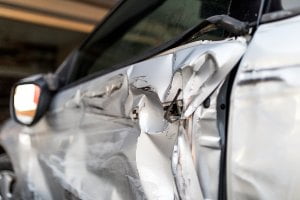 There are numerous considerations with the value of a Lafayette car crash claim. For instance, the victim’s lawyer needs to determine if the victim will need ongoing medical treatment and how much pain and suffering may be worth.
There are numerous considerations with the value of a Lafayette car crash claim. For instance, the victim’s lawyer needs to determine if the victim will need ongoing medical treatment and how much pain and suffering may be worth.
There are other factors involved that you might think should be unrelated to the value of a case, such as the severity of damage to your vehicle. Insurers have biases about vehicle damage. They assume victims did not suffer severe injuries unless their vehicle suffered severe damage.
Below, Galloway Jefcoat’s experienced Lafayette car accident attorneys explain how the amount of damage to your vehicle may affect the value of your case.
Free consultation and no upfront fees. Call us today at: 337-984-8020.
How Vehicle Damage Could Indicate Who Is at Fault
Vehicle damage can tell you how a crash happened and which driver is likely at fault. For example, severe damage to the rear of your car combined with no skid marks can be telling evidence. It may indicate the other driver was distracted and did not hit the brakes until the last second.
If a crash happened in the middle of an intersection, the location of the damage may indicate who had the right of way before the collision. For example, side-impact damage to the victim’s vehicle often indicates he or she had the right of way and the other driver is at fault.
This evidence may be particularly true if there were no other vehicles in the intersection heading in the same direction as the at-fault driver. The indication in this situation is likely that the offending driver ran through a red light.
If you hit the side of a vehicle that was in the middle of making a right turn, it could mean the other driver is at fault for trying to turn when there was not enough space to do so. Things may be more complicated if you rear-ended a driver who just completed a right turn. The insurance company might say you had a chance to avoid the collision and may be partially at fault.
Is There a Correlation Between the Amount of Damage and Severity of Injuries?
The idea that crash victims are more likely to suffer severe injuries if their vehicles have significant damage sounds entirely rational. However, there are plenty of crashes where things do not play out this way. You can suffer severe injuries in crashes that do not cause catastrophic damage to your vehicle. You could also suffer minor injuries despite your car being declared a total loss by your insurance company.
There are many other factors involved in the severity of a crash victim’s injuries, such as how your vehicle holds up in the collision. Some vehicles, like SUVs and pickup trucks, are better equipped to absorb crash impacts, thereby protecting occupants from severe injuries. Sometimes these vehicles do not suffer severe damage, other times they suffer severe damage on the outside while vehicle occupants are well protected on the inside.
Newer vehicles often do a better job protecting occupants than older vehicles. Even though the damage to the vehicle might not seem too severe, people in older vehicles may suffer major injuries.
Another factor to consider is whether the victim is more prone to injury because of his or her age or an existing medical condition. For example, elderly people may be more likely to suffer serious injuries in car crashes, no matter how severe the crash. Someone who already has a back or neck injury could experience aggravation of that injury because of a collision, no matter how minor it may be.
Yet another factor is the type of injury suffered. A rear-end crash can cause whiplash, leaving the victim in pain for months or even longer afterward. This type of injury could happen despite minor damage to your vehicle, such as the need to replace the bumper.
The Eggshell Plaintiff Rule
Fortunately, insurance companies cannot reduce the value of your claim simply because you are older or have a medical issue that makes you more likely to get injured. Insurance companies must take crash victims as they find them. After a crash, you have the right to seek compensation for all related injuries, including aggravation of an existing injury.
Proving the Value of Your Medical Care and Other Damages
Even though it is difficult to establish a correlation between minor vehicle damage and the value of a crash victim’s injuries, you can bet the insurance company will try.
It is up to your lawyer to provide strong evidence establishing the value of your damages. For example, your lawyer may work with expert witnesses to explain how you were seriously injured while your vehicle did not suffer catastrophic damage. Your medical records and treatment notes from your doctor will also play a significant role in proving the value of your damages.
Call Galloway Jefcoat’s Experienced Attorneys For Assistance
One of the most important things to do after suffering a serious injury in a Louisiana car crash is to call a lawyer to discuss legal action. Insurance companies often undervalue claims and without a lawyer at your side, it is going to be difficult to secure all the compensation you need. One reason for this is that a lawyer has the option to file a lawsuit.
Galloway Jefcoat has been fighting for vehicle accident victims for more than 25 years. Our firm has obtained millions for crash victims – we have obtained more than $900 million for all our clients.
There are no upfront costs. Call to learn more: 337-984-8020.